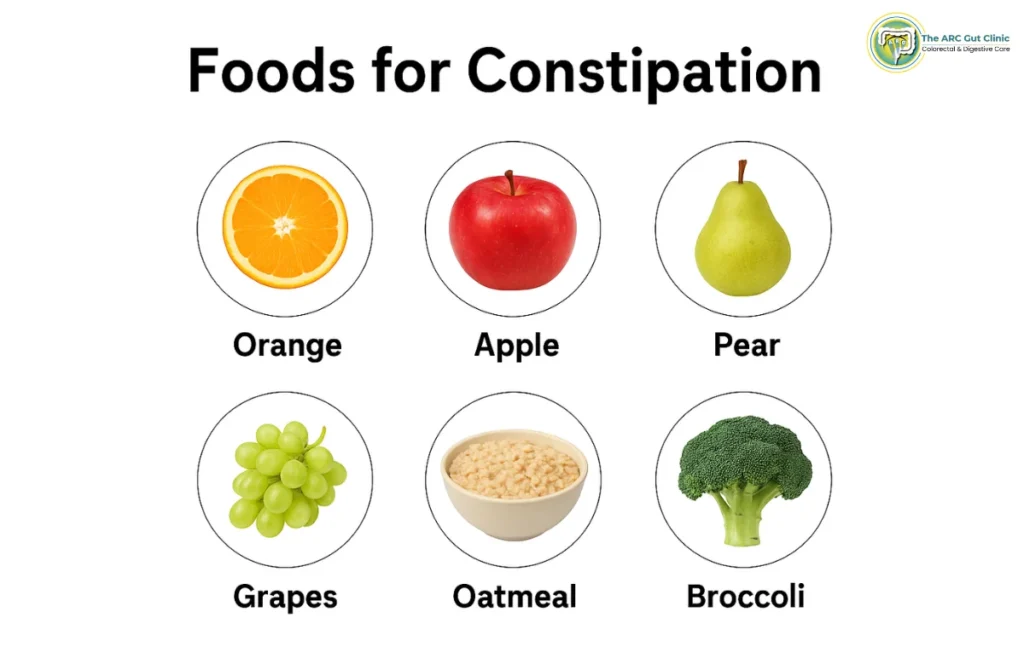Constipation is a common digestive issue characterized by infrequent bowel movements, difficulty passing stool, or a sensation of incomplete evacuation. It often results from poor dietary habits, dehydration, a sedentary lifestyle, or underlying medical conditions. When the colon draws too much water from food, it causes stools to harden and become difficult to pass. Addressing constipation naturally involves understanding the role of diet in maintaining regularity. Incorporating the right foods for constipation can soften the stool, stimulate bowel cancer screening, and restore digestive balance without the need for medication.
Diet and Constipation
Managing constipation effectively starts with mindful eating. Choosing the right foods for constipation and avoiding those that trigger bloating can make a significant difference in digestive health.
- Eat High-Fiber Fruits and Veggies: Apples, pears, berries, and leafy greens are among the best fiber foods for constipation, helping soften stool and improve regularity.
- Include Whole Grains and Legumes: Oats, lentils, and brown rice are effective foods to relieve constipation fast, as they add bulk and promote movement in the colon.
- Drink Plenty of Water: Fiber needs water to work. Without it, stools may harden and become challenging to pass.
- Avoid Processed and Low-Fiber Foods: Foods to avoid when constipated and bloated include white bread, fried snacks, and red meat, which slow digestion and worsen symptoms.

Foods High in Fiber
Fiber-rich foods are essential for healthy digestion and regular bowel movements. They not only help soften the stool but also support gut health, making them ideal foods for constipation and long-term digestive balance. Below are key categories and examples of the best fiber foods for constipation, explained with detailed bullet points under each subheading.
Legumes (Lentils, Chickpeas, Beans)
- Legumes are among the most effective foods to relieve constipation fast, offering both soluble and insoluble fiber.
- One cup of cooked lentils provides over 15 grams of fiber, helping bulk up stools and improve bowel movement.
- Chickpeas and black beans also promote gut health by nourishing beneficial bacteria.
Whole Grains (Oats, Quinoa, Brown Rice)
- Whole grains retain their fiber-rich bran, unlike refined grains that contribute to the foods to avoid when constipated and bloated list.
- Oats contain beta-glucan, a soluble fiber that forms a gel-like texture, easing stool passage.
- Regular consumption of quinoa and brown rice promotes smoother digestion and consistent bowel movements.
Fruits with Skin (Apples, Pears, Berries)
- These are highly effective foods for constipation due to their combination of fiber and water content.
- The skins are rich in insoluble fiber, while the flesh provides soluble fiber like pectin to regulate bowel function.
- Berries also offer antioxidants, supporting overall gut health.
Vegetables (Broccoli, Carrots, Brussels Sprouts)
- Crucial for daily fiber intake, these veggies support bulk formation and stool softness.
- Their fiber feeds the gut microbiome, helping reduce bloating and irregularity.
- Unlike heavy, processed foods, they don’t fall under foods to avoid when constipated and bloated, making them ideal for daily meals.
Nuts and Seeds (Chia Seeds, Flaxseeds, Almonds)
- Chia and flaxseeds soak up water and swell, forming a gel that helps lubricate the digestive tract.
- Almonds provide fiber along with magnesium, which can further assist in muscle contractions of the colon.
- These are excellent foods for constipation, especially when soaked or added to smoothies, yogurt, or oatmeal.
Eat More Fiber to Relieve Constipation
Adding fiber-rich foods to your meals is a proven way to ease constipation and improve digestive health. Maintaining a proper balance of fiber and hydration supports regular bowel movements and reduces bloating.
- Include Whole Plant-Based Foods: Fruits, vegetables, legumes, and whole grains are the best fiber foods for constipation, offering bulk and softness to the stool.
- Increase Fiber Slowly: Introduce foods to relieve constipation fast, like oats or apples, gradually to avoid gas or discomfort.
- Stay Well Hydrated: Water is essential when eating fiber-rich foods—it helps prevent stool from hardening.
- Avoid Processed, Low-Fiber Foods: Limit foods to avoid when constipated and bloated such as white bread, fried snacks, and sugary treats, as they can slow digestion.
Are there Foods that Make you Poop Instantly?
Some foods can promote quick bowel movements by stimulating digestion and softening stool. These options are effective foods for constipation and can offer fast, gentle relief.
- Prunes and Prune Juice: Rich in fiber and sorbitol, prunes act as natural laxatives and are among the top foods to relieve constipation fast.
- Chia Seeds (Soaked): These absorb water and form a gel that eases stool passage, making them one of the best fiber foods for constipation.
- Warm Water with Lemon: Hydrates the gut and stimulates bowel contractions, especially helpful on an empty stomach.
- Papaya and Bananas: These fruits aid digestion and help soften stools naturally without triggering discomfort or bloating. Avoid pairing them with foods to avoid when constipated and bloated for best results.
What Else Helps with Constipation?
- Eat High-Fiber Foods: Lentils, oats, chia seeds, apples, and pears add bulk to stool and support regular bowel movements.
- Choose Foods to Relieve Constipation Fast: Prunes, kiwis, and figs contain natural laxatives like sorbitol that help ease constipation quickly.
- Add Water-Rich Fruits and Vegetables: Oranges, watermelon, cucumbers, and zucchini hydrate the gut and work with fiber to soften stool.
- Avoid Constipating Foods: Processed snacks, red meat, fried foods, and dairy can worsen constipation and lead to bloating.
- Drink Plenty of Water: Staying well-hydrated is key to helping fiber work effectively and preventing hard stools.
- Stick to Regular Meals: Eating at consistent times each day encourages healthy digestion and bowel regularity.
- Stay Active: Gentle exercise like walking or yoga helps stimulate the bowels and improve movement.
Can Exercise Help Constipation?
Exercise can help relieve constipation by stimulating the digestive system and promoting regular bowel movements. When combined with a high-fiber diet and proper hydration, physical activity supports smoother digestion and overall gut health.
- Promotes Bowel Movement: Activities like walking or cycling help muscles in the intestines push stool through more efficiently.
- Works Well with High-Fiber Foods: Exercise enhances the effects of fiber-rich foods for constipation such as oats, lentils, and apples.
- Speeds Up Digestion: Regular movement reduces the time stool stays in the colon, preventing it from becoming hard and dry.
- Eases Bloating: Light activity can reduce gas and discomfort, especially when avoiding foods that cause constipation and bloating.
- Supports Digestive Rhythm: Consistent exercise helps maintain regularity when combined with timely meals and water intake.
Foods to Avoid When Constipated
Certain foods can make constipation worse by slowing digestion or reducing stool moisture. Avoiding these items can support the effectiveness of high-fiber foods and help improve bowel regularity.
- Processed and Packaged Foods: Items like chips, frozen meals, and instant noodles are low in fiber and can slow down digestion, making constipation more likely.
- Red Meat: Lacking fiber and hard to digest, red meats like beef and pork can lead to slower bowel movements if not balanced with fiber-rich foods.
- Fried and Greasy Foods: Foods high in unhealthy fats reduce gut motility and may cause bloating and discomfort when constipated.
- Full-Fat Dairy Products: Cheese, milk, and ice cream may worsen constipation, especially in people sensitive to lactose.
- Refined Grains: White bread, pasta, and rice lack fiber compared to whole grains, making them less helpful during constipation.
- Unripe Bananas: These contain resistant starch that can be harder to digest, unlike ripe bananas or foods to relieve constipation fast like prunes.
- Sugary and Caffeinated Drinks: Soda and excessive coffee can cause dehydration, leading to harder stools and more straining.
Conclusion
Making the right dietary choices is one of the most effective ways to manage and prevent constipation. Prioritizing fiber-rich foods such as oats, lentils, fruits, and vegetables supports smoother digestion constipation & diarrhea and regular bowel movements. Pairing these foods with adequate water intake and regular physical activity can further enhance their benefits. At the same time, limiting processed foods, red meat, full-fat dairy, and fried items helps reduce bloating and digestive discomfort. Consistency in eating habits, hydration, and movement plays a crucial role in long-term digestive health.
Take small daily steps—add more fiber, drink enough water, and stay active—to naturally support your digestive system.




